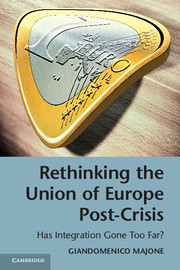Book contents
- Frontmatter
- Contents
- List of abbreviations
- Introduction: varieties of regional integration
- 1 Monetary union as a metaphor
- 2 A political culture of total optimism: its rise and fall
- 3 Integration and its modes
- 4 Deepening integration: transaction costs and socio-political limits
- 5 European integration and the decoupling of politics and economics
- 6 From the democratic deficit to a democratic default? The normative dimension of the euro crisis
- 7 ‘More Europe’
- 8 The limits of leaderless Europe
- 9 Integration through cooperative competition
- 10 The nation state between globalization and regional integration
- Bibliography
- Index
5 - European integration and the decoupling of politics and economics
Published online by Cambridge University Press: 05 May 2014
- Frontmatter
- Contents
- List of abbreviations
- Introduction: varieties of regional integration
- 1 Monetary union as a metaphor
- 2 A political culture of total optimism: its rise and fall
- 3 Integration and its modes
- 4 Deepening integration: transaction costs and socio-political limits
- 5 European integration and the decoupling of politics and economics
- 6 From the democratic deficit to a democratic default? The normative dimension of the euro crisis
- 7 ‘More Europe’
- 8 The limits of leaderless Europe
- 9 Integration through cooperative competition
- 10 The nation state between globalization and regional integration
- Bibliography
- Index
Summary
Rise and decline of a liberal principle
The possibility of separating economics and politics was a key, if implicit, assumption of the founders of the EEC. It was not a new idea, but rather a return to a classic liberal tenet which in the nineteenth century and up to World War I had made it possible for the world economy to develop in such a fashion that ‘between national and international economic integration there was only a difference in degree but not in kind’ (Roepke 1954: 219). During the mercantilist era of the seventeenth and eighteenth centuries, the relationship between state power and international trade was seen as a problem of exceptional importance, one which was formulated as a debate about the interventionist obligations of rulers rather than as a matter of free trade (Brewer 1989). Against the mercantilist promotion of the power of the state, state regulation of trade, and the subordination of economic goals to political power, liberalism advocated the widest possible separation of the two spheres of politics (government) and economics. By aid of this principle of separation it was possible to reduce to a minimum the economic implications of the coexistence of sovereign states with their different legal orders and systems of administration, their frontiers, and separate citizenship. Applying this same principle of separation between politics and economics to the monetary field, it was possible to create an effective international monetary order: the gold standard. Absent a world government, there could not exist a genuine de jure world money system guaranteeing the possibility of payments at stable exchange rates, but the gold standard made it possible to achieve, in practice, the same result: if not a de jure at least a de facto world monetary system. As Roepke (1954: 225) has argued, in no area can the significance of the principle of the de-politicization of the economic sphere be seen as clearly as in the case of money. In the heyday of the international gold standard, the 1870s to 1914, surrender of national monetary sovereignty was considered not only acceptable but positively beneficial. On the one hand, no serious problems seemed to arise from the application of the essential conditions, or ‘rules of the game’, for operation of a gold standard – including the condition that within each country of the system there must be a high degree of wage flexibility.
- Type
- Chapter
- Information
- Rethinking the Union of Europe Post-CrisisHas Integration Gone Too Far?, pp. 149 - 178Publisher: Cambridge University PressPrint publication year: 2014
- 1
- Cited by



